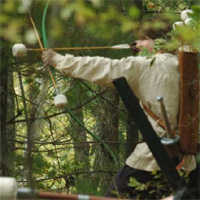Live-action game
 |
|
| Years active | 1978–present |
|---|---|
| Setup time | 15 minutes |
| Playing time | 2 hours to 14 days |
A live-action game is a game where the participants act out their characters' actions.
Some live-action games are described as a "flag wars", "combat sports" or "battle gaming". Although these are strictly live-action games, they lack the plot and 'character assumption' that is usually a part of live-action gaming. That is, each player assumes the persona of a character (like a 'handle' in an online environment) and maintains that personae until the character dies.
This variation occurs because of the variation that also exists in table-top and computer games. Some table-top games (like Monopoly) don't require that you undertake to play a persona. But games like Dungeons and Dragons do have this requirement. The same is true of computer games. The player of the single-player version of Half-Life assume the role of a character with a name and personality. The player of Tetris does not.
Live-action gaming is sometimes described to novice players as a hobby lying somewhere between LARP and historical reenactment. This is accurate in that the game contains the WYSIWYG philosophy and minimialist rules of historical reenactment, but adds the unpredictable outcome and player-created plot found at some LARP events.
Rules for live-action games are extremely simple compared to other forms of live interactive games like American Football or Orienteering. Combat is simulated, with one hit causing a wound. There are no 'hit points' or other conventions. Game rules are not used as stand-ins for components of the imaginary environment. If a novice player cannot immediately understand a rules convention, that rules convention is not used. Referees are not used and players are relied upon to be honest in their application of the rules. A special effort is made to convey and adhere to the Spirit of the Game.
The key to live action gaming is an attempt by the game directors to create a WYSIWYG environment. Instead of using a laminated card to represent a magical staff, an actual staff is used, as one might build for a play. Weapons (such as boffer swords or airsoft guns) are almost always part of the experience. Players stay "in character" at all times (with the exception of medical emergencies). There is no convention for removing oneself from the playing environment.
...
Wikipedia
